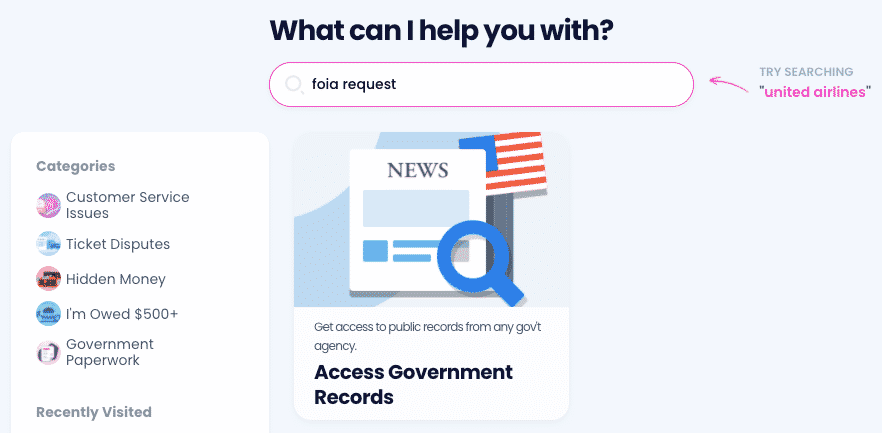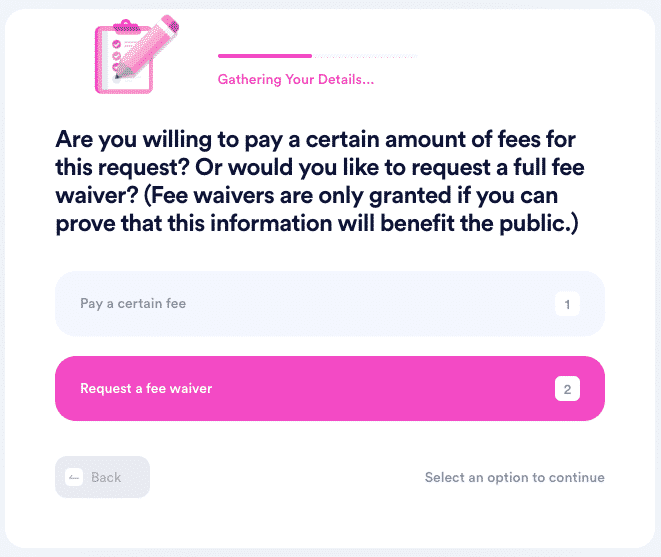DoNotPay Can Help You Write a FOIA Request Letter on Yourself
Filing a FOIA request can be difficult. You have to research agencies and existing public records, define which records you want, and write a compelling FOIA request letter. Templates can help, but you are the one who has to do the hard work.
If you want to file a FOIA request on yourself, you need to familiarize yourself thoroughly with federal agencies’ requirements. DoNotPay will show you that writing a FOIA request letter on yourself can be fast and effortless!
The Breakdown of the FOIA
To understand what it takes to file a FOIA request on yourself, you need to know the ins and outs of the Freedom of Information Act of 1966.
The FOIA specifies that any public record that doesn’t fall under the stipulated nine exemptions and three exclusions is available to the general public.
Before you submit your request, you must take a few steps:
- Define the information you want to request
- Specify the format in which you want the requested records to arrive
- Find out which federal agency holds the documents you are seeking
- Check the agency website to make sure the documents you need are not already publicly available
Every federal agency has its regulations regarding FOIA requests. Detailed information is usually available on the federal agency’s website.
Who Can File a FOIA Request?
Insight into the federal records is available to anyone, including:
- U.S. citizens
- Foreign nationals
- Universities
- Businesses
- Organizations
- State and local governments
How Long Does a Federal Agency Have To Respond to a Freedom of Information Act Request?
The FOIA response time depends on many factors, like the agency backlog or the complexity of your request. The FOIA typically allows agencies to respond within 20 working days. Agencies may extend the deadline if they need more time to process your request or need to consult with another agency.
You can speed up the procedure by providing as detailed information about the desired records as possible.
What if the State Agency Refuses To Respond to a FOIA Request?
You have a few available options if the agency denies your FOIA request:
- Go for an informal resolution—when the agency uses its backlog as an excuse to delay your request, you are faced with a few options. You can pay a fee to expedite the process, provide more information about the document you are seeking, or offer to narrow down the scope of your search
- File an appeal—if the agency denies your request, you can file an appeal to the FOIA appeal officer or the head of the agency
- Make a declassification request—when the agency refuses to disclose the record because it is classified, you can file a request for a mandatory declassification review File a lawsuit— if your internal appeal doesn’t work, you can send demand letters to the agency in the United States District Court in your state of residence
Can You File a Freedom of Information Act Request on Yourself?
The answer is yes. You can file a FOIA request on yourself using the Freedom of Information Act and the Privacy Act. You can write a request letter or fill out an online request form if the agency provides one.
After you finish writing the letter, you should submit it to the government agency that has your records.
How To Write a Freedom of Information Act Request on Yourself
If you want to increase your chances of receiving a fast response, you need to write a letter according to the agency’s regulations.
To file a FOIA request on yourself, you have to provide specific information in your request letter. The table below contains more details on the required form of your FOIA request:
| FOIA Request Letter Requirements | Details |
|
Provide agency’s information | Write the name of the agency, address, and date at the top of the document |
|
Identify the law that authorizes your request | Indicate that you are filing a request under the FOIA and the Privacy Act |
|
Describe the information you are looking for | Be specific and include as many details about the document as you can |
|
Provide personal information | Include the following:
|
|
State the purpose of your request | Specify that the information is for personal use |
|
Sign the request under penalty of perjury | Insert a sentence that defines all the information you provided are true and correct |
How To File a Freedom of Information Act on Yourself With DoNotPay
DoNotPay can help you out by writing and sending a request letter on your behalf. Our app’s extensive database will provide you insight into state and local agencies as well!
You can access any record on yourself if you perform these easy steps:
- Open DoNotPay in your
- Enter the type of records you wish to obtain
- Provide the name of the agency that holds them
- Type in the agency name, document name, or the information you need
- Opt for a fee waiver or expedited processing

You can use ’s knowledge base to learn about the meaning of the FOIA and the benefits it can provide. Discover how much FOIA fees are and where to check your FOIA request status. Exercise your FOIA rights to the max and request records from the CIA, FBI, IRS, or DHS.

DoNotPay Keeps Your Privacy Intact
DoNotPay can help you surf the web safely and securely. No need to provide your personal information to every company whose service you'd like to take for a test drive. Our Virtual Credit Card and Burner Phone products shield your data from prying eyes and dishonest merchants.
Feel like subscribing for a free trial? Make it truly free and avoid automatic membership renewals with our card. It can also help identify spammers and potential scammers who send bothersome robocalls and robo texts your way. As soon as they act on the virtual card number, DoNotPay will unmask them and demand compensation!
DoNotPay Can Help You Bring Any Business to Justice
Should a company refuse to grant you a refund or compensation, our app will help you take them to small claims court!
We'll help you cancel the service in question to avoid any future charges, and we'll call their customer service so you can get info on your denied request. We'll draft the relevant court documents for your jurisdiction and give you instructions on filing them.
More Nifty Features That'll Make Your Day
You may not have breach of privacy issues or reasons to bring someone to court, but you surely have ample motivation to save or earn a few dollars here and there—especially if we catch you unawares!
DoNotPay can show you how to reclaim funds that you didn't know were under your name or make a denied warranty appeal to any company. We streamlined the processes of requesting refunds, college fee waivers, airline flight compensation, parking infraction dismissals, as well as applying to clinical trials that pay!


